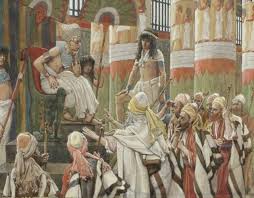Then Jacob Blessed Pharaoh
and Went Out from His Presence
47: 1-10
Then Jacob blessed Pharaoh and went out from his presence DIG: How do Jacob and his sons conduct themselves before the king of Egypt? How does Ya’akov portray himself?
REFLECT: Jacob could have acted like a big shot in front of Pharaoh. But he chose to be humble and give the glory to God. How do you react when you have something to brag about? Is there a difference between good self-esteem and conceit? How do you know where to draw the line?
Although Joseph was only accountable to Pharaoh in all of Egypt, he could not make the decision to allow his family to settle in the best part of the land, namely, Goshen (45:10) without approval from the king. But because they were in the midst of famine, in reality, no land was particularly valuable at that time. So having temporally settled his family in Goshen, Joseph went to Pharaoh and said: My father and brothers, with their flocks and herds and everything they own, have come from the land of Canaan and are now in Goshen awaiting your pleasure (47:1). This was where Joseph wanted them to settle all along (45:10. 46:28).
He chose five of his eleven brothers and presented them before Pharaoh (47:2). The text says that Joseph chose from all his brothers. But in Hebrew it literally reads that he chose from the edge, end or extremity. This suggests that Joseph selected the most outstanding ones, or the brothers who would make the best impression. The same term is used in First Kings 12:31, where Jeroboam purposefully chose non-Levites for the priesthood of Isra’el. It was not a random selection by Joseph. Like everything else he did, it was planned very carefully.716 However, the rabbis take the opposite position. They teach that Joseph took five of the most inferior brothers, fearing that Pharaoh would make soldiers out of the stronger brothers if Joseph had taken them. According to rabbinic tradition, Joseph took Reuben, Simeon, Levi, Benjamin and Issachar with him.
As Joseph had anticipated, Pharaoh asked the brothers, “What is your occupation?” And according to Joseph’s instructions (46:34), they replied: Your servants are herdsmen, just as our fathers were (47:3).717 They threw themselves upon the mercy and good grace of the king of Egypt.
They also said, “We have come to live here awhile, because the famine is so severe in Canaan and your servants’ flocks have no pasture.” They had no intention of permanently living in Egypt. So now, please let your servants settle in Goshen. Pharaoh responded directly to Joseph and said: Your father and your brothers have come to you and the land of Egypt is before you. Settle your father and your brothers in the best part of the land. Let them live in Goshen. And if you know of any among them with special ability, put them in charge of my own livestock (47:4-6). Again, this shows that Pharaoh was a Semitic Hyksos ruler, because that simply would not have been the case if he were Egyptian. But the meeting was a success in gaining permission for Jacob’s family to live in Goshen. But it reached its climax in the conversation between Pharaoh and Ya’akov.718

Then Yosef brought his father Jacob in and presented him before Pharaoh. This must have been quite a meeting, the earth’s greatest king encountering the man chosen by God to lead His people of that day. The aged and feeble patriarch stood before Pharaoh. Though the king was more powerful, Jacob was clearly superior, for it was he who blessed Pharaoh (47:7). Melchizedek had blessed Abraham (14:19), thus showing His superiority to Abraham, for the lesser person is blessed by the greater (Hebrews 7:7). When you read between the lines, you get the feeling that the king of Egypt also sensed this. He seemed subconsciously to recognize that he was speaking to a man of unusual spiritual depth and understanding, a man who had walked with ADONAI for many years.719
Therefore, Pharaoh asked him, “How old are you?” And Jacob said to Pharaoh, “The years of my pilgrimage are a hundred and thirty.” Then, because of his many years of conflict with Esau and Laban, Rachel’s death and Joseph’s supposed death, he added: My years have been few and difficult, and they do not equal the years of the pilgrimage of my fathers (47:8-9). Indeed his grandfather Abraham had died at a hundred and seventy-five years of age (25:7), and his father Isaac had died at a hundred and eighty years of age (35:28). Although he lived another seventeen years in Egypt (47:28), he knew he could not hope to live as long as they had. The longevity of mankind had begun to gradually decline from what it had been before the Flood. But the point here is that Ya’akov had the opportunity to brag about himself and act like a big shot in front of the most powerful man in the world; however, he chose to be humble and give God the glory for his life.720
Scripture doesn’t record their entire conversation, but before concluding, Jacob once again blessed Pharaoh and went out from his presence (47:10). There is finality to this statement and Pharaoh never saw him again. At any rate, in addition to the continuing witness of Yosef, this pagan king had been the recipient of the testimony, and the object of the prayers of the greatest man of his generation.721



Leave A Comment